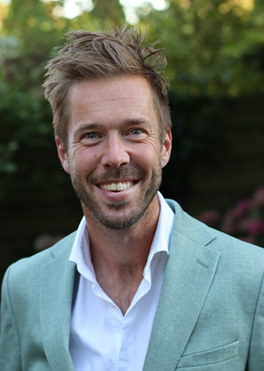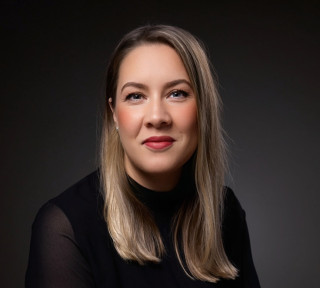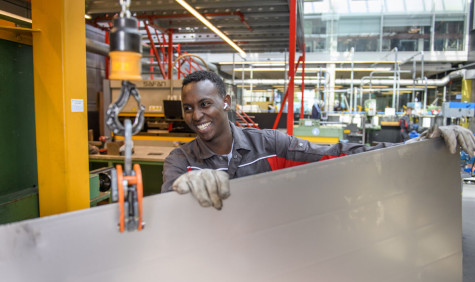Practice-based research in vocational education: from pioneering to professionalising
In only 10 years, teacher-researcher teams (practorates) have become a nationwide phenomenon: the field is professionalising. But VET schools are not research organisations, which presents challenges in areas such as digital infrastructure, funding and the role of research within the organisation. To take the next step, the ball is now in the board's court.

Jorick Scheerens
When social media took off, teachers at Mediacollege in Amsterdam quickly noticed that their students knew more about it than they did. "Just as we're seeing now with the rise of AI, we wondered: what does this mean for education?" says Jorick Scheerens, who at the time worked at the Mediacollege.
"We wanted to investigate that, to improve our education programme. The standard approach would be to involve a university of applied sciences with a research group. But I'm a communication scientist myself, so I thought: maybe we can do it ourselves." And so, in 2012, the first practorate in the Netherlands was established, with Jorick as a practor: the practorate Mediawijsheid (Media Literacy).
A hopeful idea became reality
Interest from other mbo institutions soon followed, who wanted to do the same, for instance, in the field of aviation technology or health and social care. Scheerens: "From the initial idea of ‘a practoraat for every mbo’, we set up a national network. Meanwhile, this has worked out better than we dared to hope at the time. Every secondary vocational education institution (mbo) now has a practorate: 154 in total, which are either active, in development or completed."
Jorick became programme director of what is now the Practoraten.nl Foundation. The foundation supports practorates in their start-up and further development, and strengthens the quality of practorates. In addition, the foundation promotes knowledge sharing with a platform on which research results are shared.
"Collaboration is in our DNA"
The term practoraat is—with a slight wink—derived from the lectoraat in higher professional education, but it has a much stronger focus on practice. Practorates are not focused on theorisation or publishing papers, but on improving the quality of education and students' learning processes. Research questions almost always arise directly from educational practice. Teachers, students and professional practice all benefit from the knowledge gained.

Marit Montsanto
Another characteristic of practors is that they often collaborate with external partners, such as governments, research institutions, other VET institutions and companies. Many hold a dual lector–practor position, thus making the connection between the two types of research. "Collaboration is in our DNA," says Marit Montsanto, who, as team manager at MBO Digitaal, is committed to the professionalisation of practorates.
In 2012, Marit was a colleague of Jorick Scheerens at the Mediacollege Amsterdam, where she was involved as programme manager of the Media Literacy practorate. "We both saw how the VET sector has advanced in the field of research. It’s a very encouraging development."
Research culture in mbo
But there are challenges as well. Many VET teachers do not have a research background: more than half come directly from the professional field. Montsanto says: “The desire to conduct research is definitely there, but it requires a lot of guidance from the organization. You want to avoid a study becoming an individual project that doesn’t feed back into the whole. That’s why we help set up structures that make that possible.”
In addition, VET colleges lack the facilities that are taken for granted in universities of applied sciences and research universities. “VET institutions are not legally classified as knowledge institutions,” Scheerens explains. “That means they often do not have access to software licenses, databases, or research budgets. In the beginning, we often had to ‘borrow’ from universities of applied sciences. Fortunately, major steps have been taken in recent years, such as pilots providing access to scientific literature and agreements with SURF on ICT facilities.”
"It is time to make choices"
Despite the growth, funding for practorates remains a sensitive issue. Unlike universities of applied sciences and universities, mbo has no statutory research mandate, so it often comes down to individuals to look for resources. "That’s a difficult position for an mbo teacher to navigate," Marit argues.
"It is time to make choices: where do you position research in the organisation? Directly under the Executive Board, or as a separate pillar alongside education and innovation? That has an impact on visibility and effectiveness. The ball is really in the directors' court now. Funding is often pulled from temporary sources; for instance, the National Growth Fund Programme Npuls provides resources for establishing a Centre for Teaching & Learning (CTL). But ultimately it has to be structurally embedded in budgets, hours and facilities. Only then can practorates develop further."
Practorates have more access to research calls these days, but strong data management is a prerequisite there too, Jorick argues. "The standards for good research, such as reliability, validity and careful handling of research data, apply just as much to mbo. But then they need the right facilities. So we are also looking together with SURF: where is the need and how does it match with what is available?"
To the next phase
Where will this sector be in 5 years? Both see a clear point on the horizon. "It's a bit of wishful thinking, because we still have some barriers to overcome," says Marit. "It is very special that there are already so many practorates while the phenomenon is still so young. Now we are ready to jointly look at how we can connect all the initiatives. And what we as a sector expect from practorates and the research they carry out."
Also, access to scientific literature and access to research funds from the Ministry of Education, science funder NWO and Nationaal Regieorgaan Onderwijsonderzoek (NRO) would give the necessary boost to get to the next level, Marit believes. "Then we can also move towards a joint platform for the publication of knowledge and experience. That way, we can transcend the enthusiasm of individuals."
Jorick hopes that in 5 years, the facilities and support will be at a level equivalent to that of higher education. "Not the same, because the research is different, but equivalent in the sense that we will be facilitated and supported in such a way that does justice to the task we have set ourselves: to develop knowledge to strengthen mbo practice. If we all push in the same direction, we should get it right relatively quickly and easily."
Text: Josje Spinhoven
'Practice-based research in vocational education: from pioneering to professionalising' is an article from SURF Magazine.
Back to SURF Magazine
Questions in response to this article? Mail to magazine@surf.nl.
